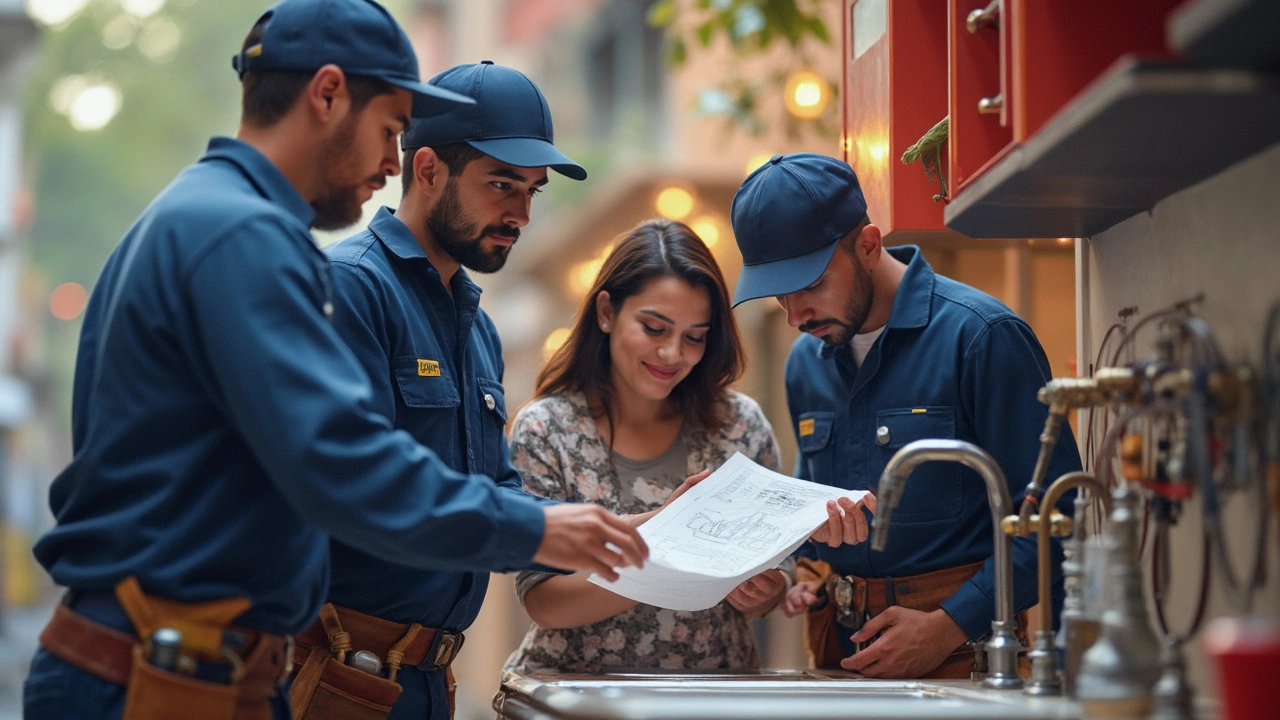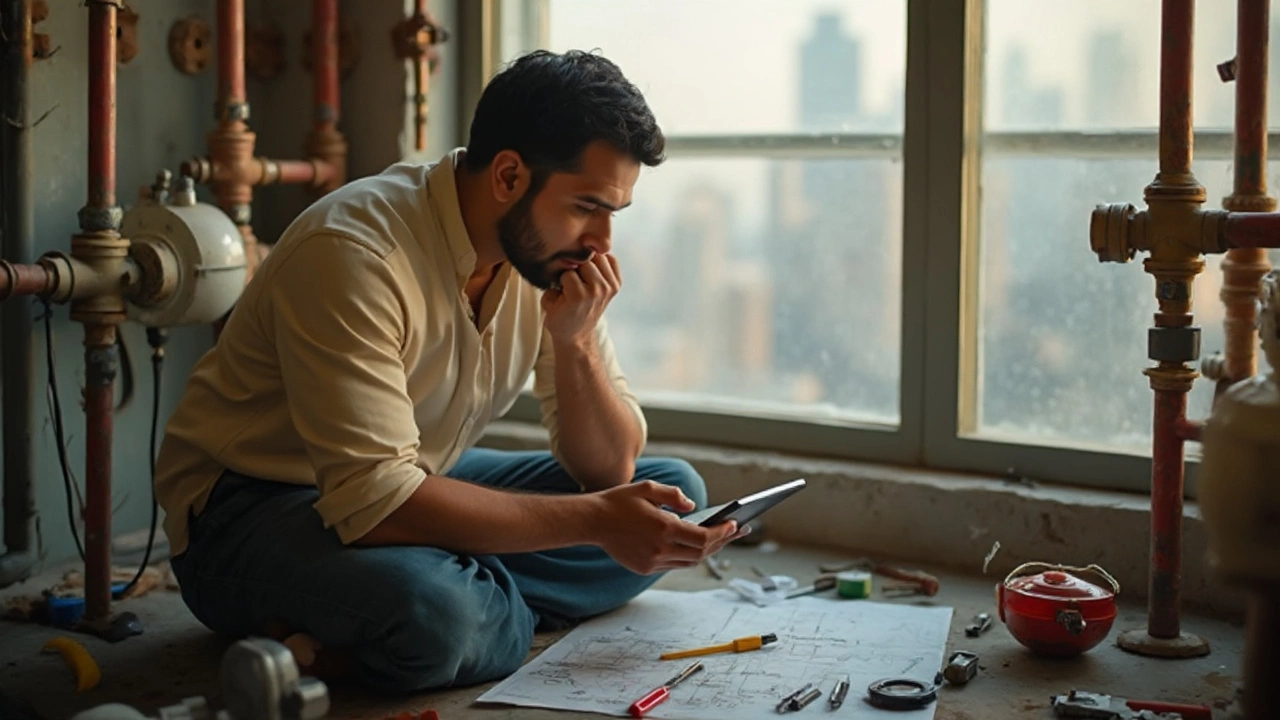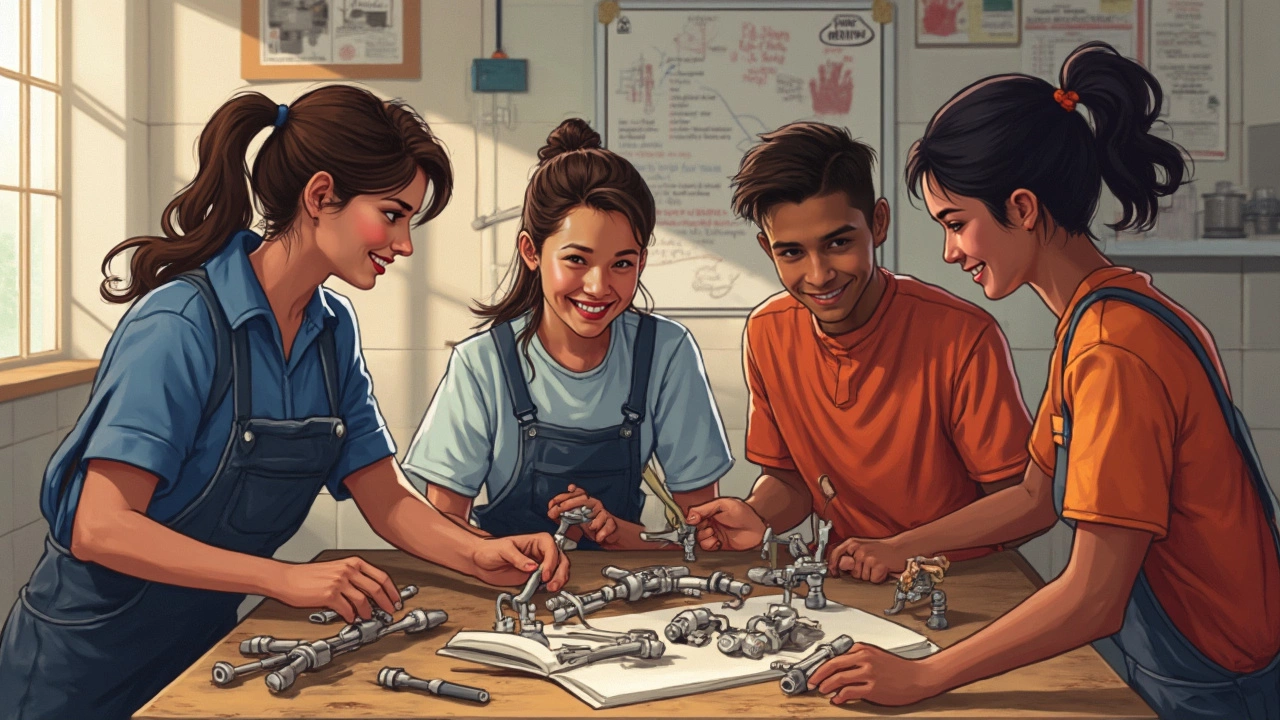
If you've ever wondered what keeps people fired up about being a plumber, the truth is, the perks go way beyond unclogging drains or fixing leaks. Most plumbers will tell you—no two days are the same. One day, you’re in a fancy high-rise tracing a hidden pipe leak and the next, you’re helping someone get their hot water back after a week of cold showers. Each call tosses you a new puzzle to crack.
Sure, plumbing comes with its messy moments. But ask any experienced plumber, and they’ll admit the job gives them more control than they ever got working behind a desk. Plumbers don’t have to worry much about job cuts when the economy slows down. Leaky pipes and broken boilers don’t care if it’s a recession. If you like making things work, using your hands and your head at the same time, there aren’t many jobs out there that compare.
- Every Day is Different
- Job Security and Good Pay
- Real-World Problem Solving
- Making a Tangible Difference
- Tips for Success in Plumbing Training
Every Day is Different
Plumbing is not a clock-in, clock-out kind of job. You won’t be stuck fixing the same problem over and over—in fact, you’ll rarely see the same thing twice in a week. Some customers call you out because water is gushing under the sink, others need a whole bathroom remodeled, and sometimes, you’re needed for emergencies like pipes bursting at midnight in the winter.
One day you’re crawling in a cramped crawlspace under a house, the next you're at a restaurant making sure their kitchen pipes can handle a busy Friday night. And in a city, you never know who’ll open the door—a local small shop, a landlord with a multi-storey apartment, or someone in a historic building with pipes from the 50s. There’s a real mix of routine fixes and jobs that challenge you to try new tools or materials you’ve never laid hands on before.
This kind of variety keeps people interested. According to the U.S. Bureau of Labor Statistics, plumbing is one of the few *trade jobs* where work can shift from residential homes to shopping centers and even outdoor public spaces all within the same month. If you like problem-solving and hate boring routine, plumbing means you’re always learning and never stuck in a rut. Every job is a fresh challenge.
Job Security and Good Pay
Not many jobs offer the kind of stability that plumbing does. Think about it: every house, building, and business needs working pipes and fixtures. In the US alone, the Bureau of Labor Statistics (BLS) shows a steady demand for plumbers, pipefitters, and steamfitters, with job growth expected to keep climbing in the next few years. Even when the economy gets rocky, plumbing work stays steady because nobody wants to go long without running water or heating.
You’ll hear stories from plumbers who stuck with their trade through every recession—still getting calls and picking up more jobs when others lost work. According to the BLS, the median annual salary for plumbers in 2024 was around $63,000, and it isn’t rare for skilled plumbers to earn much more, especially if they own their own business or work overtime. Compare that to a lot of other jobs that require a four-year degree, and you can see why so many people are drawn to plumbing training.
"Plumbing is one of those trades where the work doesn’t dry up. No matter what’s happening out there, people always need plumbers." — Mike Rowe, host of Dirty Jobs
And here’s the kicker: you can enter this field without taking on massive student debt. Most plumber training programs are apprenticeships, meaning you get paid while you learn. It's real-world experience from day one. If you’re practical and not afraid to hustle, plumbing isn’t just a job—it can be a solid career move for long-term security and good pay. If you’re looking at plumber training and worry about the future, this is a safe bet.

Real-World Problem Solving
Plumbers face real problems every single day—and solving them takes more than just muscle. For starters, there’s no one-size-fits-all solution in this job. A blocked main line at a restaurant at lunchtime? That’s a different animal compared to changing a kitchen faucet in someone’s home. You use common sense, creativity, and a bit of science. Every house is built a little differently, and plumbing systems are full of surprises.
Let’s break it down: when you walk into a job and there’s a leak behind the wall, you can’t see the pipes directly. A plumber has to guess what's going on using signs like water stains, drips, or even sounds. It’s a bit like detective work. Then you figure out the fastest way to fix it without tearing apart the whole house. That’s problem solving in action.
Some jobs go further. Commercial plumbing systems can get complicated, with automatic valves, pumps, and sensors. Knowing how to read blueprints and use specialized tools—like inspection cameras or electronic pipe locators—gives plumbers the edge. Plumbing technology keeps changing, too. Today, plumbers are expected to install water-saving devices and smart plumbing systems, especially in new homes and eco-friendly buildings.
It’s not just about pipes and wrenches. Plumbers deal with water pressure calculations, local building codes, and sometimes even gas lines. One wrong move and you can flood a whole floor. That’s why formal plumber training makes such a difference. Those who go through solid training courses get hands-on practice and learn to think on their feet, making them ready for anything the job throws at them.
If you like the idea of walking into a situation, figuring out what’s wrong, and fixing it for good, plumbing is one of the few trades where you can show off your problem-solving skills every day—and get rewarded for it.
Making a Tangible Difference
If you're the type of person who wants to see real results from your work, being a plumber delivers on that every single day. Most jobs out there don't let you actually see the impact of what you do. Plumbers, on the other hand, get to finish the job and know their work keeps homes, schools, and hospitals running. There’s instant feedback—when a family gets water back or a business avoids a plumbing disaster, you see the relief on their face. That’s hard to beat.
Take healthcare buildings, for example. Hospitals can’t function without a perfect plumbing system. Clean water and working restrooms are not a luxury—they’re essential for hygiene. Even in homes, a single plumbing fix can stop mold from growing, reduce bills, and keep a place safe for kids and seniors. Studies show that plumbers play a key role in keeping public health standards high, especially in cities.
Here’s where it gets interesting: according to the U.S. Bureau of Labor Statistics (BLS), plumbers stop about 240,000 gallons of water waste for every major leak they fix over a year. That’s enough water to fill almost a third of an Olympic-sized pool! The table below shows some real numbers, so you can see the impact:
| Plumbing Fix | Water Saved Per Year | Public Health Benefit |
|---|---|---|
| Major Leak Repair | ~240,000 gallons | Prevents water damage and mold |
| Toilet Replacement | ~13,000 gallons | Reduces household water bills |
| Pipe Replacement | Varies by building | Boosts hygiene and safety |
The bottom line? When you’re in plumber training, you aren’t just learning a trade, you’re learning how to step up and help people in a direct way. You’re the person who solves emergencies and makes sure things get back to normal fast. Not many careers hand you that kind of real-world impact—plus a grateful customer at the end of the job.

Tips for Success in Plumbing Training
Getting through your plumbing training isn’t rocket science, but it does take steady effort and smart habits. Most programs blend classroom hours with hands-on experience—if you skip either one, you’ll get caught out fast later on the job.
Here’s what can really make a difference:
- Show up every day—on time. Plumber training programs and apprenticeships expect you to treat it like a job. Instructors notice who takes it seriously.
- Focus on safety rules. Whether it’s handling tools or dealing with water heaters, you’ll need those habits every single day.
- Practice your math. No joke—math is a big part of plumbing. You’ll be measuring pipe runs and calculating water pressure from day one.
- Keep your tools clean and organized. Learning good habits now saves you hours of stress later.
- Ask questions. There are no dumb questions at this stage. Trainers and master plumbers like students who want to get it right.
Let’s look at a few quick stats that show why sticking with plumbing training pays off:
| Fact | Details |
|---|---|
| Average starting salary | $48,000 (U.S., 2024, after apprenticeship) |
| Unemployment rate in trades | Less than 3% for plumbing jobs |
| Training duration | Typically 4-5 years (apprenticeship + classes) |
| Certification required? | Yes, most states require licensing exams |
If you’re thinking about jumping into a plumber training course, know you’ll be picking up skills you can use anywhere. The foundation you build here sets you up for solid pay, job options, and the pride that comes from fixing real problems in people’s homes or businesses. Stick with it—it’s worth it.